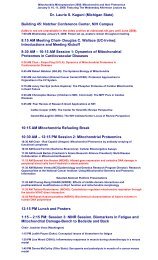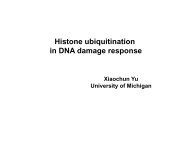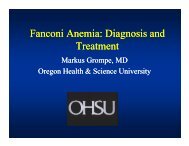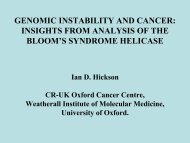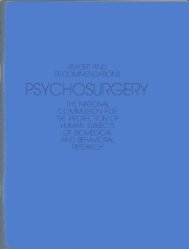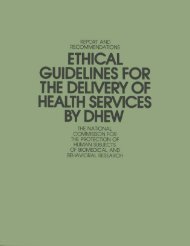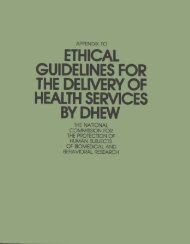RESEARCH ON THE FETUS - National Institutes of Health
RESEARCH ON THE FETUS - National Institutes of Health
RESEARCH ON THE FETUS - National Institutes of Health
Create successful ePaper yourself
Turn your PDF publications into a flip-book with our unique Google optimized e-Paper software.
Meetings <strong>of</strong> the Commission. Secretary Weinberger administered the oath<br />
<strong>of</strong> <strong>of</strong>fice to the members <strong>of</strong> the Commission on December 3, 1974, thereby fixing<br />
the deadline for this report. Section 202(b) <strong>of</strong> the <strong>National</strong> Research Act<br />
requires that recommendations <strong>of</strong> the Commission with respect to research on the<br />
living fetus be transmitted to the Secretary "not later than the expiration <strong>of</strong><br />
the 4-month period beginning on the first day <strong>of</strong> the first month that follows<br />
the date on which all members <strong>of</strong> the Commission have taken <strong>of</strong>fice." This<br />
4-month period expired April 30, 1975.<br />
The Commission conducted seven meetings devoted primarily to the topic<br />
<strong>of</strong> research on the fetus. These meetings were well attended by the public.<br />
One day <strong>of</strong> the February meeting was devoted to a public hearing <strong>of</strong> the views <strong>of</strong><br />
persons interested in research on the fetus; oral testimony was given by 23 witnesses,<br />
some representing research, religious or other organizations and some<br />
appearing as concerned citizens to express their viewpoints (see Section VI for<br />
summaries <strong>of</strong> the views presented). At the March meeting, three public <strong>of</strong>ficials<br />
testified about the involvement <strong>of</strong> their respective agencies or <strong>of</strong>fices in<br />
research on the fetus (see Section VI), and the members <strong>of</strong> the Commission held<br />
a roundtable discussion with several ethicists who had prepared papers covering<br />
a wide spectrum <strong>of</strong> secular opinion and religious persuasion (see Section V for<br />
summaries <strong>of</strong> these papers).<br />
Studies and Investigations. The Commission contracted for a number <strong>of</strong><br />
studies and investigations. These included a study, undertaken primarily through<br />
review <strong>of</strong> the literature, <strong>of</strong> the nature, extent and purposes <strong>of</strong> research on the<br />
fetus, conducted under contract with Yale University (see Section II); an historical<br />
study <strong>of</strong> the role <strong>of</strong> research involving living fetuses in certain advances<br />
in medical science and practice, conducted under contract with Battelle-Columbus<br />
Laboratories (see Section III); and a study utilizing available data to establish<br />
guidelines for determining fetal viability and death, conducted under contract<br />
with Columbia University (see Section VII).<br />
In addition to these studies, papers outlining their views on research on<br />
the fetus were prepared by the following ethicists and philosophers: Sissela Bok<br />
<strong>of</strong> Harvard University; Joseph Fletcher <strong>of</strong> the Institute <strong>of</strong> Religion and Human<br />
Development; Marc Lappé <strong>of</strong> the Hastings Institute <strong>of</strong> Society, Ethics, and the<br />
4



